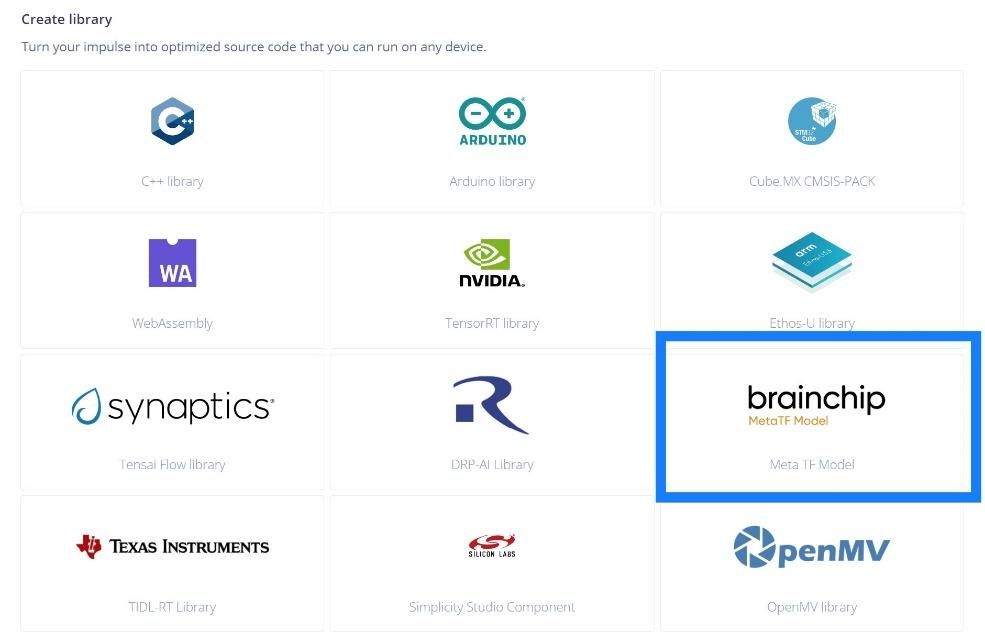We are pleased to announce official support for the BrainChip Akida platform including the integration of the MetaTF™ framework into the Edge Impulse Studio. This will enable our semiconductor partners that integrate BrainChip’s Akida fully-digital, event-based neuromorphic IP into their SoCs, as well as developers using the Akida™ PCIe board, making BrainChip the first strategic AI IP partner enabled on the Edge Impulse platform. BrainChip and Edge Impulse have taken a very unique approach to provide power into the hands of anyone who wants to apply and leverage the benefits of neuromorphic computing without being an expert in the field.
The Akida™ PCIe board uses the AKD1000, BrainChip’s first Akida-enabled device released in 2022. This board can be plugged into a developer’s existing system to unlock capabilities for a wide array of edge AI applications, including Automotive/Smart Transportation, Smart City, Smart Home (including health and wellness devices), and Smart Factory/Industrial use cases. Linux machines with the AKD1000 are supported by Edge Impulse so that you can sample raw data, build models, and deploy trained embedded machine learning models directly from Edge Impulse Studio to create the next generation of low-power, high-performance ML applications.
Neuromorphic computing is a completely different approach to AI. It often combines analog, digital, and mixed-signal architectures to construct physical artificial neurons inside the chip. It more closely resembles how the brain operates on a hardware level, rather than relying on emulating neuron activity in traditional von Neumann or Harvard architectures (the microprocessors and microcontrollers that are in use today). By reimagining the hardware for performing neural network computations, incredible power savings can be achieved.
BrainChip has avoided the analog/mixed-signal challenge and built a fully-digital, event-based neuromorphic IP platform which makes it extremely portable across foundries, and very configurable to fit specific footprint and power constraints. Akida is also the only available edge IP solution that supports one-shot/few-shot learning on device – untethered from the cloud.
Traditionally, to achieve these compelling power efficiencies, neuromorphic computing relies on spiking neural networks (SNNs), which operate unlike traditional artificial neural networks. SNNs use a leaky integrate-and-fire model, where individual neurons are only “activated” when a particular input potential threshold is reached from the various connected upstream neurons. Such activations are modeled as differential equations, which makes SNNs notoriously difficult to train.
Again, BrainChip has focused on developer simplicity with the innovative, free MetaTF tool that transparently converts advanced deep learning models such as feed-forward CNNs and recurrent RNNs networks into equivalent SNN networks to seamlessly run on Akida technology. MetaTF is integrated into the Edge Impulse Studio to provide developers the ability to build, train, and deploy models with limited to no code requirements. This captures the benefits of the “spiking” event-based computation while making it seamless for the developer to use their preferred environment and preferred models to tune them predictably on the platform. Most importantly, the developer does not need to learn the intricacies of neuromorphic compute or SNNs. BrainChip also has a free to use Akida Model Zoo that are Akida optimized networks of existing models to provide developers with examples and give them a head start into leveraging the neuromorphic technology.
Akida licensable IP: This is a unique, fully-digital, event-based, neuromorphic IP processor that mimics the human brain to analyze only essential sensor inputs at the point of acquisition — processing data with unparalleled efficiency, precision, and economy of energy. It is very scalable from 1-256 nodes (each with 4 NPUs and configurable localized SRAM memory). It includes its own smart DMA that enables it to run most feed forward CNNs without any intervention from the CPU, and most complex networks with minimal compute from the CPU.
Enablement packages: The Akida platform is available to users through an array of development kits, all through the following links:
- Akida™ Development Kit - Raspberry Pi - BrainChip Inc
- Akida™ Development Kit - Shuttle PC - BrainChip Inc
- Akida™ PCIe Board - BrainChip Inc
Getting Started with AKD1000/MetaTF on Edge Impulse
- Purchase BrainChip AKD1000 via one of the enablement platforms.
- Download free to use Akida Python Package in your favorite environment manager on MetaTF to use AKD1000.
- Follow our AKD1000 documentation to learn how to develop models for the AKD1000 using Edge Impulse Studio.
Note that the AKD1000 is not a standalone computer. At this time, the AKD1000 is a neuromorphic processor that is currently available only on a PCIe board. You will need to pair it with a host computer that has an available PCIe slot. For portability, the Raspberry Pi Compute Module 4 IO Board has such a PCIe slot and is a perfect match for your AKD1000 development board. The host computer oversees running your operating system (e.g., Linux) and subsequent ML program that controls the AKD1000 coprocessor.
To quickly get started, please see these example projects that are available to clone immediately for quick training and deployment to the AKD1000 development platform.
- FOMO project using BrainChip MetaTF and AkidaNet models
- Image classification project using BrainChip MetaTF and AkidaNet models
Model Development Using the Akida™ Blocks
Deployment Options
Models must be converted from their original format to run on an AKD1000. This can be done by selecting the BrainChip MetaTF Model Block from the Deployment Screen. This will generate a .zip file with models that can be used in your application for the AKD1000. The block uses the MetaTF toolkit to convert quantized models to SNN models that are compatible with the AKD1000.

